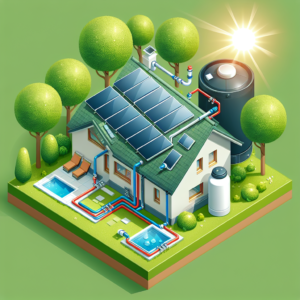Solar water heaters have surged in popularity thanks to their eco-friendly and cost-effective approach to heating water. However, picking the right solar water heater for your specific climate is crucial for getting the most out of your investment. In this comprehensive guide, we’ll explore various factors to consider when selecting a solar water heater, with a particular emphasis on how climate influences your decision.

Types of Solar Water Heaters
Active Solar Water Heaters
Active solar water heaters come equipped with pumps and controls for water circulation, making them well-suited for regions with varying weather conditions. These systems efficiently operate even on cloudy days, ensuring a consistent supply of hot water. If you reside in an area with unpredictable weather, an active system is a dependable choice.
Passive Solar Water Heaters
In contrast, passive solar water heaters rely on natural convection for water circulation, offering a simpler and cost-effective solution. They shine in climates with steady sunlight and minimal temperature fluctuations. Passive systems are renowned for their reliability, particularly in areas with stable weather patterns and ample sunshine.
Climate Considerations
Your region’s climate plays a significant role in determining your solar water heater performance. Factors such as temperature, sunlight availability, and local weather conditions should guide your decision-making process. Recognizing how climate impacts your choice is essential.
Active Solar Water Heaters in Different Climates
Active systems excel in regions with fluctuating weather conditions. For example, in areas with cold winters, these systems can efficiently supplement traditional heating methods, ensuring a consistent hot water supply even during temperature drops. Their ability to harness solar energy, even on overcast days, makes them a reliable choice in diverse climates.
Passive Solar Water Heaters in Different Climates
Passive systems thrive in areas blessed with consistent sunlight. In such climates, they provide a steady stream of hot water with minimal energy consumption, making them an eco-friendly option. The simplicity of passive systems also means fewer components that can wear out, contributing to their longevity. If you live in a location with abundant year-round sunlight, a passive solar water heater may be the perfect fit.
Hybrid Solar Water Heaters
Hybrid solar water heaters offer the best of both worlds by combining active and passive elements. They prove highly efficient in regions with both sunny summers and harsh winters, adapting seamlessly to diverse climates. During winter months, these systems can switch to passive mode, relying on available sunlight, and revert to active mode when necessary. This adaptability makes them an excellent choice for areas with variable weather patterns, ensuring a consistent supply of hot water throughout the year.
Sizing Your Solar Water Heater
Properly sizing your solar water heater is crucial for optimal performance. Consider factors like your household’s hot water usage and the local climate to determine the ideal size that meets your needs efficiently. An oversized system may lead to unnecessary expenses, while an undersized one may not provide sufficient hot water during peak demand. By carefully calculating the size based on your climate and usage patterns, you can maximize your solar water heater’s efficiency.
Maintenance for Optimal Performance
Regular maintenance is key to ensuring your solar water heater’s longevity and efficiency. Different climates may require specific maintenance routines to keep the system operating at its best. In areas with harsh winters, it’s essential to check for freeze protection, while regions with high humidity may require additional checks for corrosion prevention. Maintenance not only prolongs the life of your system but also ensures it operates efficiently year-round, regardless of climate challenges.
Cost Considerations
While the initial cost of a solar water heater may raise concerns, it’s essential to consider the bigger picture. Evaluate how climate factors into the payback period and long-term savings, which vary by region. In areas with abundant sunlight, the return on investment may be quicker due to reduced energy bills. However, in colder climates, the benefits may take longer to materialize. Analyzing cost-effectiveness based on your local climate and energy prices is vital to making an informed decision.
Incentives and Rebates
Governments often provide incentives and rebates to promote solar water heater adoption as part of their renewable energy initiatives. These incentives vary based on location and climate, so it’s essential to research available programs in your area. Regions with harsher climates may offer more substantial incentives to encourage solar water heater adoption, helping offset the initial investment. Taking advantage of these programs can make your solar water heater even more cost-effective while contributing to a greener future.
Environmental Benefits
Beyond cost savings, solar water heaters significantly reduce your carbon footprint. They decrease reliance on fossil fuels and lower greenhouse gas emissions. In areas with strong environmental awareness or those prone to extreme climate conditions, the environmental benefits of solar water heaters can be particularly appealing. By harnessing the power of the sun, you not only save money but also help protect the planet for future generations.
Consumer Tips for Decision Making
Considering a solar water heater? Here are some practical tips to ensure you make the right choice:
- Carefully assess your budget and available space.
- Research local climate patterns, including temperature fluctuations and sunlight availability.
- Investigate available incentives and rebates in your area to maximize cost savings.
- Seek professional advice for system installation to guarantee optimal performance, especially in regions with unique climate challenges.
Conclusion
In conclusion, selecting the right solar water heater tailored to your climate is a decision with far-reaching benefits. By understanding the type of system suitable for your region’s climate, sizing it correctly, considering maintenance, costs, environmental impact, and available incentives, you can make an informed choice that not only saves you money but also reduces your environmental footprint.




